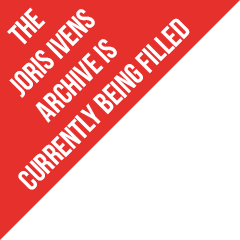

.bmp)
On Monday, December 12 Mrs. Fadila Laanan, Minister of Culture and Audiovisual of theFederation Wallonia-Brussels presents, in the presence of Mrs. Marie Storck (the daughter of Henri Storck) the first two DVD titles of the Henri Storck Collection. The most famous film from the oeuvre of the Belgian documentary filmmaker Henri Storck (1907-1999) was Borinage (1934), which he and Joris Ivens made in the Walloon mining.
On the first DVD from a series of four films are early recorded images by Storck in his hometown Ostend. Like Ivens, Storck developed a passion for movies by watching movies in a filmclub, where the innovative avant-garde films of the twenties were shown.He had founded this Cineclub himself in 1928 and met young filmmakers as Rene Clair.Thanks to the personal contact with artists like Spilliaert Ostend, Ensor, Labis Permeke his films were of an artistic charge. Like Ivens he shot his first film exercises from the hand, without a tripod with a Kinamo camera doing so he made poetic and surreal short films, in which movement plays a central roll. He also experimented with innovative camera techniques, such as a camera car on a beach. From his hometown, he began to boast of documentary films. Gradually he became the most important documentary filmmaker of Belgium, which yielded him international fame.
In August 1933 he visited Joris Ivens in Paris with the request to make a film together in the Walloon Borinage mining district, where the miners had suffered under therepercussion measures after a big strike. In September, they both went into the area and were shocked by what they found. Because of the gendarmes part of their film had to be shot illegally. With the support of the miners Borinage became a genuine and profound indictment of the crisis, which is still gripping. This film and other social documentaries of Storck, such as House of misery (1937), are on the second DVD.
Alongside social documentaries Storck practiced a variety of different film styles and genres: corporate films for companies, major anthropological films such as Jack Symphony (1942-44) and festivals in Belgium (1969-1972), classical art films Belgian masters like Delvaux, Permeke, Labis and Rubens, fiction films at home and the Belgian colony of Congo.
Like Ivens he combined his work as a film artist with many features in which he intended to increase the production environment, distribution and quality of the documentary arts. With his skills, friendly attitude, perspective and clear vision he managed to connect people and inspire. In 1938 he was one of the founders of the Royal Belgian Film Archive.He was an active member of the International Federation of Film sur l`Art and the International Association of Documentaristes. In Brussels he founded the Centre de l`Audio-visual à Bruxelles (CBA) and the Centre du Film sur l`Art (CFA).
He received the title of doctor honoris causa of the Université Libre de Bruxelles and the Vrije Universiteit Brussel.
Henri Storck died in September 1999. His legacy is managed by the Fund Henri Storck. They together with the Royal Film Archive release the four DVDs.
See: www.cinemathek.be
.png)
Henri Storck is still inspiring for filmmakers like Patric Jean :
http://www.youtube.com/watch?v=1ZxEMDc1M80